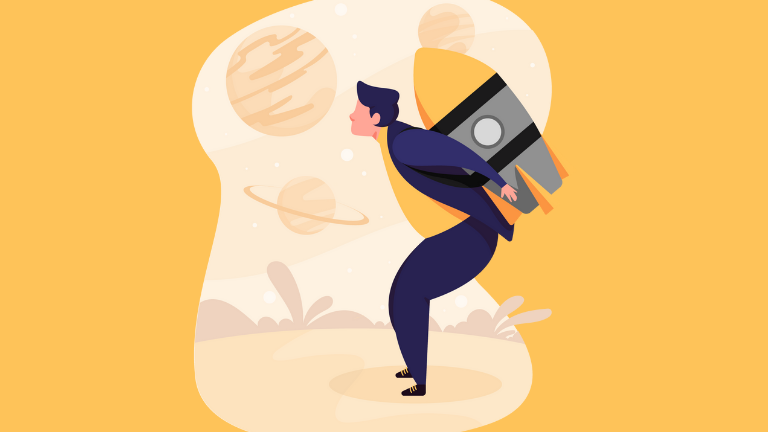Self-confidence is important for moving through life in a pleasant way. How exactly does self-confidence come about? And why does it sometimes falter? Psychologist Shannon explains what self-confidence is – and what you can do to keep it up.
“Am I asking a stupid question?” “Am I doing it right?” “Do they like me? Insecurity can play a role in many aspects of your life – at work, during an education and in friendships. And while it’s very human, insecurity can be damned inconvenient. Shannon: ‘Self-confidence is about: do I dare to take on things; do I trust that I can do things? And that is not a static thing, but a changing process that continues throughout life.
What is self-confidence
Within psychology we make a distinction between two essential pillars on which your development is based, namely your innate disposition – nature – and the experiences you acquire in your life – nurture. These two influences also determine how confident or insecure you feel in certain situations.
Did your parents give you a strong personality? Then that has a positive influence on your self-confidence. Have you been laughed at once during a presentation at school? Then that affects your self-esteem. Sometimes this happens structurally – for example in bullying. Avoidance can then occur: you then avoid situations in your work or in your social life in order not to be exposed to that bad feeling again.
Social media or not?
The use of social media is discussed when it comes to self-confidence for a reason. Shannon: ‘We are group animals, we want to belong. Realistic or not: it is human nature that we want to meet the ideal standard that is presented on social media. If you notice that you already naturally struggle a bit with your self-image, then using social media will probably reinforce this.
“Realistic or not, it is human for us to want to meet the ideal standard presented on social media.”
Culture also plays a role in self-confidence. In our society, for example, individual performance is central, while in Asia the collective is predominantly considered more important. Individual failure therefore carries more weight in our society: if you don’t know what you’re doing or if you don’t succeed for a moment, it feels like your own fault. The adage “let’s keep it fun” also holds strong with us. That does not help much when you feel ashamed or vulnerable. Good to know: these feelings often diminish as you get older: our ability to put things into perspective grows with age.
How to increase your self-confidence
Does it matter for your self-confidence whether you are at home or at work? ‘To a certain extent. Of course a company culture and a good job match has an effect on how safe or unsafe you feel in a job. But the experiences that made you self-confident – for better or worse – you always and in every situation carry with you like a backpack.
Fortunately, that backpack is not closed: it is always possible to add to it relativizing and strengthening experiences.’
1. Realize: it is normal
Everyone feels insecure at some point in their lives. Even artists who are performing for the umpteenth time in front of millions of people. It’s not weird or stupid if you’re insecure.
Read also: 6 Ways to Step out of Your Comfort Zone and into Your Growth Zone
2. Focus on the positive and celebrate your success!
Write down 3 points for yourself every night, focusing on what you did well or what went well because of you. (For example, “I cooked healthy for myself today.”)
3. Ask people around you for your positive attributes
Often the image you have of yourself is unfairly a lot less rosy than how other people see you. Ask, ‘When you think of me as a person, what comes to mind?’
4. Don’t compare yourself too much to other people
Don’t look at other bodies, careers, achievements or houses: focus on yourself and neutrally assess your own situation. It is unrealistic to compare yourself with a top athlete when you have just started with sports. Training your mind is the same way as training your body: practice a lot and be routine, then it will come easier and easier.
5. Look at yourself with mildness
Do you regret something you said? Do you think you made a mistake? Think about what you would say to a friend who was in your shoes. Write it down and say it to yourself in the mirror.
6. Take a critical look at your social media
What does social media do to you? If you find that using it sometimes leaves a negative aftertaste, think about what can go out the door and what you really like. Set a maximum usage time for yourself and think: what could you do with the time you have left?
7. Lower the bar
Even with a few percentages less performance, it is still more than enough to get by.
8. Replace ‘I need to’ with ‘I may’
Now look if you still want to do things. Allow yourself to ‘not do’ something when you need time for yourself.
9. Try a psychologist
Psychologists are there to ask you constructive, critical questions – to look at your thoughts and see which are correct and which aren’t, and to help you with dealing with insecurities.
10. Give yourself some time
Insecurity doesn’t happen or change overnight. Self-confidence neither. Allow yourself some time and space to tackle it. Focus on the steps you are taking and the progress you are making, instead of solely focussing on the end goal.





